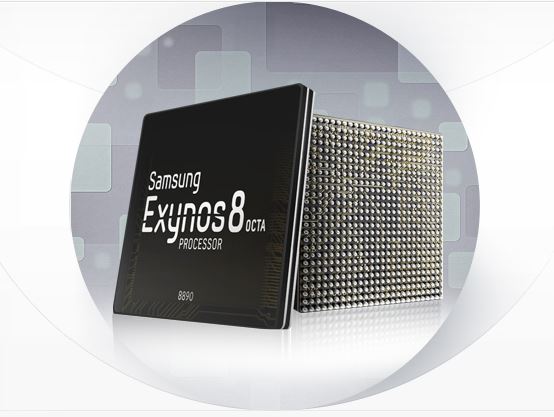Samsung Begins Mass Production Of Next-Generation 14nm LPP Chips
Samsung announced that it has begun the mass production of chips utilizing its 14nm Low-Power Plus (LPP) process node. The LPP process node is the second generation 14nm FinFET process from Samsung, which brings improvements in energy efficiency as well as performance.
Samsung's Exynos 7 Octa chip, which powers the Galaxy S6, was built on the 14nm Low-Power Early (LPE) process node. The new process node will be used to build both Samsung's own next-generation chip, the Exynos 8 Octa, as well as Qualcomm's Snapdragon 820. The chips are expected to arrive in the first half of this year.
"We are pleased to start production of our industry-leading, 2nd generation 14nm FinFET process technology that delivers the highest level of performance and power efficiency" said Charlie Bae, executive vice president of sales and marketing for System LSI Business at Samsung Electronics. "Samsung will continue to offer derivative processes of its advanced 14nm FinFET technology to maintain our technology leadership."
Samsung says that the new LPP process delivers up to 15 percent improvements in speed as well as up to 15 percent improvements in power consumption compared to the LPE process. Samsung's new process is one of the best in the chip market, surpassed only by Intel's own 14nm process.
However, Intel has a small share of the smartphone and IoT (Internet of Things) markets and it doesn't let other chips makers use its fabs. Therefore, the most cutting edge chips in the smartphone and IoT markets this year will use either Samsung's 14nm LPP process or TSMC's 16FF+ process.
Qualcomm should be the main beneficiary of Samsung's new process this year. With a new CPU core and a modern process, the Snapdragon 820 will likely avoid the overheating issues of its predecessor, the Snapdragon 810, although it will still largely depend on whether Qualcomm will push the chip past its optimum performance levels or not. Samsung's next-generation chip will also use a custom CPU core and should benefit from the same 14nm LPP improvements.
Lucian Armasu is a Contributing Writer for Tom's Hardware. You can follow him at @lucian_armasu.
Get Tom's Hardware's best news and in-depth reviews, straight to your inbox.
Lucian Armasu is a Contributing Writer for Tom's Hardware US. He covers software news and the issues surrounding privacy and security.
-
utroz Sweet. Just in time for AMD to get Zen out before the end of 2016. Also AMD has gpu's made on 14LPP that should be out in a couple months.Reply -
hannibal But we don't know if they use "old" 14lpp or this new 14lpp+.Reply
I suppose that big part of Samsung production capacity goes to Samsung own mobile chips, Apple and snapdragon 820... It will not leave much to other products.
But good that they are getting a little bit nearer the Intel! -
utroz Reply17328380 said:But we don't know if they use "old" 14lpp or this new 14lpp+.
I suppose that big part of Samsung production capacity goes to Samsung own mobile chips, Apple and snapdragon 820... It will not leave much to other products.
But good that they are getting a little bit nearer the Intel!
Samsung has 14nm LPE (Low Power Early) and now 14nm LPP (Low Power Plus) Also GF has licensed Samsungs 14nm tech so they will be the ones actually making AMD's gpu's and cpu's so Samsungs capacity issues should not effect AMD. My guess is GF should be close mass production as well because they are using the same tech and doing an almost Intel like copy exact process to allow companies to go back and forth from Samsung to GF without issues. -
alextheblue ReplySamsung has 14nm LPE (Low Power Early) and now 14nm LPP (Low Power Plus) Also GF has licensed Samsungs 14nm tech so they will be the ones actually making AMD's gpu's and cpu's
Right they could realistically source from Samsung too if GF had issues.
Anyway, if AMD is using 14 LPP for their GPUs and CPUs, who is using TSMC's 16nm node? Just ARM designs, or Nvidia too? -
utroz Reply17335584 said:Samsung has 14nm LPE (Low Power Early) and now 14nm LPP (Low Power Plus) Also GF has licensed Samsungs 14nm tech so they will be the ones actually making AMD's gpu's and cpu's
Right they could realistically source from Samsung too if GF had issues.
Anyway, if AMD is using 14 LPP for their GPUs and CPUs, who is using TSMC's 16nm node? Just ARM designs, or Nvidia too?
From the rumors I hear AMD is going to have some GPUs coming from GF and some from TSMC 16nm FF+ (second gen of TSMC 16nm). I don't think they will be the same exact GPU's (like apple and the A9 SOC dual sourced from both), I am thinking lower power GPU's on 14nm LPP and the high end GPU's on 16nm FF+ . but could be totally wrong. Nvidia is using TSMC's 16nm FF+ for their next gen GPU's. I am sure TSMC has tons of other customers using 16nm tech. Apple is using TSMC 16nm FF for half of the A9 SOC's. -
Outlander_04 ReplyBut we don't know if they use "old" 14lpp or this new 14lpp+.
I suppose that big part of Samsung production capacity goes to Samsung own mobile chips, Apple and snapdragon 820... It will not leave much to other products.
But good that they are getting a little bit nearer the Intel!
We already know both GF and Samsung will be making AMD's Zen processors and next generation GPU's in 14 nm LPP process .
The polaris graphics chips are already running, and so are early examples of Zen .
